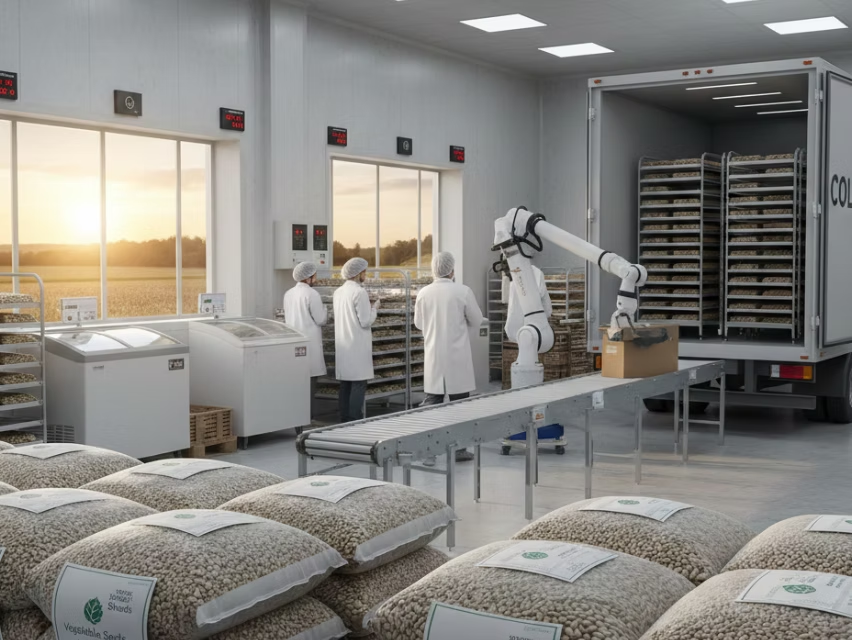The Role of Seed Coating Innovations in the Seed Industry
- IRIS Hybrid Seeds

- Nov 5, 2025
- 4 min read
Updated: Nov 6, 2025

How Technology is Transforming the Future of Farming
The global seed industry has evolved beyond simply supplying seeds — it now delivers seed-based innovations designed to enhance productivity, sustainability, and resilience in agriculture. One of the most significant advancements driving this change is seed coating technology — the process of applying protective and performance-enhancing materials to seeds.
Seed coating has advanced from basic polymer layers to bioactive, biodegradable, and nano-enabled coatings that protect seeds and support healthy early growth. As modern agriculture faces challenges like climate change, soil degradation, and increasing input costs, seed coating innovations have become a cornerstone of sustainable farming systems.
The Benefits: Why Seed Coating Innovations Matter
Better Germination & Crop Establishment
Seed coatings act as a barrier against moisture loss, pathogens, and mechanical damage. They help ensure uniform germination, healthier seedlings, and stronger root systems — ultimately improving crop yield and field performance.
Precision Delivery of Inputs
Modern seed coating innovations now allow for controlled release and targeted delivery of vital inputs such as:
Nutrients and micronutrients
Microbial inoculants
Insecticides and fungicides
Growth stimulants
Biologicals (e.g., Trichoderma, Rhizobium)
These precision coatings reduce excessive chemical use and maximize input efficiency, supporting eco-friendly and cost-effective farming.
Enhanced Seed Flowability & Planting Efficiency
Seed coatings improve weight, shape, and smoothness, making seeds easier to handle and plant mechanically. For small or irregularly shaped seeds (like vegetables and grasses), this improvement enhances precision planting, reduces wastage, and boosts operational efficiency.
Climate-Smart Support
Seed coating innovations also contribute to climate-resilient farming by helping seeds tolerate:
Drought conditions
High salinity
Extreme temperatures
Next-gen biopolymer coatings promote root vigor and water-use efficiency, enabling plants to thrive even under adverse conditions.
Future-Forward Innovations in Seed Coating

The seed industry is investing heavily in R&D to develop the next generation of coatings, including:
Bioactive coatings with beneficial microbes for disease resistance and plant vigor
Nano-formulations for controlled nutrient release
Biodegradable, food-safe polymers to reduce plastic waste
Smart coatings that respond to soil and moisture conditions
Digital tagging technologies for traceability and seed authentication
These innovative seed coatings aim to make farming smarter, more sustainable, and less dependent on heavy chemical inputs.
You Can Read Also : What Floods Do to Farm Land ? & Why Recovery is Critical ?
The Challenges: Innovation vs. Accessibility
While the benefits are clear, some challenges remain:
Ensuring affordability for small and medium farmers
Maintaining environmental safety and regulatory compliance
Scaling technologies for different crop types and regions
Balancing innovation with accessibility will be essential to ensure widespread adoption of seed coating technologies.
What This Means for the Future of Agriculture

The seed coating industry, already valued in billions, is expected to grow rapidly as global demand rises for:
Sustainable farming solutions
Higher productivity per acre
Climate-resilient crops
Reliable seed supply chains
Seed companies are no longer just selling genetics — they’re becoming partners in total crop performance. In the near future, coated seeds will become the industry standard, particularly for high-value and climate-sensitive crops.
You Can Read Also : How Intercropping Can Maximize Crop Benefits and Boost Farm Productivity
Buy the Best Hybrid Seeds from IRIS Hybrid Seeds Pvt. Ltd.!
Looking for top-quality hybrid seeds for maximum yield and reliability? Connect directly with IRIS Hybrid Seeds Pvt. Ltd., a trusted leader in innovative seed technology and sustainable agriculture.
Address: Office No. 1, H-8, 3, Model Town Phase 3, Opposite Punjab National Bank, New Delhi – 110009, India
Call / WhatsApp: +91 93100 99132 | +91 79828 89886
Email: admin@irisseeds.com
Final Thought
Seed coating innovations are revolutionizing agriculture from the ground up. By improving germination, reducing chemical footprints, and enhancing stress tolerance, they pave the way for sustainable, smart, and resilient farming.
For the global seed industry, the mission is clear — ensure that these innovations remain farmer-friendly, eco-conscious, and adaptable to changing agricultural dynamics.
In essence, seed coating innovations represent not just a technological evolution, but a strategic shift toward a stronger, more sustainable future for farming.
FAQs
What are seed coating innovations?
Seed coating innovations refer to the use of advanced materials and technologies — such as polymers, biologicals, and nanotechnology — to coat seeds. These coatings enhance seed protection, improve germination, and enable precise delivery of nutrients and microbial agents that support early plant growth and overall crop performance.
How do seed coatings improve germination and crop yield?
Seed coatings act as a protective layer that shields seeds from pathogens, moisture loss, and environmental stress. They also supply essential nutrients and beneficial microbes directly to the seed, ensuring faster germination, stronger root systems, and uniform plant establishment, which ultimately leads to higher crop yields.
Are modern seed coating materials safe for the environment?
Yes. New-generation seed coatings are designed to be biodegradable, non-toxic, and eco-friendly. They replace harmful synthetic materials with bio-based polymers and natural binders, reducing chemical use and promoting sustainable farming practices that are safe for both soil and the environment.
Which crops benefit most from seed coating technologies?
Seed coating innovations are beneficial for a wide range of crops, including cereals, pulses, vegetables, oilseeds, and grasses. They are especially useful for high-value and climate-sensitive crops, where uniform germination, stress tolerance, and yield consistency are critical.
What is the future of seed coating in agriculture?
The future lies in smart seed coatings that combine biologicals, nano-formulations, and digital tagging. These coatings can respond to soil moisture, release nutrients gradually, and improve traceability across the supply chain — driving precision farming, sustainability, and climate resilience in agriculture.




Comments